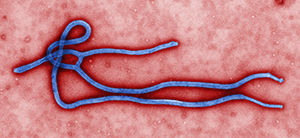Survey researches reaction to Ebola virus

This colorized transmission electron micrograph (TEM) revealed some of the ultrastructural morphology displayed by an Ebola virus virion. See PHIL 1832 for a black and white version of this image.
November 17, 2014
Students received emails from the [email protected] requesting participation in a survey “on the use of social media as a source of communication about Ebola” within the past few weeks.
The survey will gather information about how people in the Kent area perceived Ebola and the risk of its exposure. This information will be applied to social media, mainly Twitter.
“Science is always trying to understand how people respond to risk,” said Eric Shook, creator of the survey and assistant professor for computational GIS. “One potentially new way to gauge this response is by looking at tweets on Twitter, but it has not been tested.”
The researchers are looking to get a rapid grant, which will allow them to analyze the tweets in the Kent region during the first possible risk of Ebola exposure when the nurse diagnosed with the virus traveled to the area.
“There’s a lot of places that have experienced it, but we’re the only campus that has a possible connection,” said Greg Gibson, director of the survey research lab.
The survey will be available for another week, and researchers encourage participation, as the information gathered would further examination of human factors and disease models, Gibson said.
The survey asks students their habits before and after learning about the possible exposure to Ebola in the area. This includes hand-washing, use of hand sanitizer and avoiding public transportation.
“The more data that we get, the more information we have that we can link to Twitter,” Shook said.
The researchers plan to use the information gathered from the survey and apply it to social media to find a “ground-truth.” In other words, the comparison will validate if the information is representative of the population.
The survey will extend via phone calls to residents in the Kent region. Gibson mentioned how important it is to include cell phones during the survey because 41 percent of homes no longer have landlines.
“We plan to do phone surveys for residence near campus to see if there’s a different response, which would be scientifically interesting,” Shook said.
Through this data, researchers hope to find the change in behavior people have before and after learning about the risk and possible exposure of the disease.
“The goal of the project is to test whether tweets about Ebola in and around campus actually capture how people respond to the perceived risk of Ebola by comparing tweets to the results from these surveys,” Shook said.
Contact Samantha Ickes at [email protected].











